|
|
|
Sort Order |
|
|
|
Items / Page
|
|
|
|
|
|
|
| Srl | Item |
| 1 |
ID:
113729
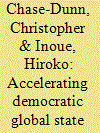

|
|
|
|
|
| Publication |
2012.
|
| Summary/Abstract |
This article discusses the evolution of the international system and global governance within the Europe-centred modern world-system since the 15th century in the context of a comparative framework that includes interpolity systems since the Stone Age. The evolution of the modern system includes the emergence of the European system of sovereign national states and colonial empires, the extension of the Westphalian system to the non-core by succeeding waves of decolonization, the rise and fall of successively larger hegemons, the deepening of global capitalism in waves of globalization, the emergence of weak international regulatory institutions and the prospects for and the rapid emergence of global democracy. It is not claimed that a global state has already emerged, but the authors see the long-term processes as the early stages of the emergence of a world state, and consider how these processes might be accelerated within the next few decades. The need for democratization of the institutions of global governance is also discussed. However, in this article, the focus is more on real geo-historical processes than normative questions, outlining the evolution of interpolity institutional orders, describing the challenges in thinking about global state formation, and discussing some of the technological and political forces that might accelerate the long-term trend toward global state formation.
|
|
|
|
|
|
|
|
|
|
|
|
|
|
|
|
| 2 |
ID:
141033
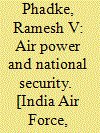

|
|
|
|
|
| Edition |
1st ed.
|
| Publication |
New Delhi, Pentagon Press, 2015.
|
| Description |
xii, 316p.hbk
|
| Standard Number |
9788182748408
|
|
|
|
|
|
|
|
|
|
|
|
Copies: C:2/I:0,R:0,Q:0
Circulation
| Accession# | Call# | Current Location | Status | Policy | Location |
| 058312 | 355.03/PHA 058312 | Main | On Shelf | General | |
| 058313 | 355.03/PHA 058313 | Main | On Shelf | General | |
|
|
|
|
| 3 |
ID:
165534
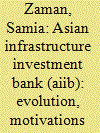

|
|
|
|
|
| Summary/Abstract |
China-led Asian Infrastructure Investment Bank (AIIB) was launched in 2016. Prior to that, the leadership and authority of the Multilateral Development Banks (MDB) were mainly controlled by the United States (US), Western Europe and Japan. Now the world has been experiencing the emergence of a new player in this domain, China. The China-led AIIB has sparked a major debate over China’s motivations behind establishing the Bank and the geostrategic implications of the Bank for both regional and extra-regional actors. Therefore, the paper endeavours to understand why China has created the AIIB. It also explores the geostrategic implications of the Bank for the region and beyond. Finally, the paper addresses certain challenges which the Bank needs to address to be a fullfledged MDB.
|
|
|
|
|
|
|
|
|
|
|
|
|
|
|
|
| 4 |
ID:
091251
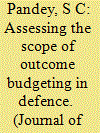

|
|
|
|
|
| Publication |
2009.
|
| Summary/Abstract |
This paper traces the evolution of the concept of outcome budget; examines the linkage between defence budgeting and defence planning in Indian context and the issues/concerns arising out of the present system before examining the scope of introducing outcome budget for defence and security apparatus in India.
|
|
|
|
|
|
|
|
|
|
|
|
|
|
|
|
| 5 |
ID:
173298
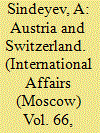

|
|
|
|
|
| Summary/Abstract |
THE WORLD ORDER is undergoing yet another transformation, and one whose result is hard to foresee.1 Europe is getting ready to get involved in rivalries among options for globalization, and this means it is again important for scholars to take up something that until recently was in danger of becoming a peripheral area of research - holistic studies of individual countries, including analysis of behavior models of smaller states and their desire and resources for relationships with larger actors.
|
|
|
|
|
|
|
|
|
|
|
|
|
|
|
|
| 6 |
ID:
143779
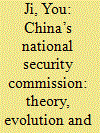

|
|
|
|
|
| Summary/Abstract |
The establishment of the National Security Commission (NSC) of the Chinese Communist Party (CCP) is a major regrouping of the top CCP power structure, a ‘New Deal’ in Xi Jinping’s endeavor to revitalize China. In full operation it will reshape Beijing’s national security (NS) decision-making process concerning the formulation of national security strategies, crisis management at home and abroad, coordination of national security policies and actions by Party/army/state agencies and institutional links with its foreign national security counterparts. This article argues that the NSC will primarily address the Party’s internal security concerns, which is the key link to its efforts to strike a new balance between various security typologies. It analyses Beijing’s securitization guidance and practice and constructs its organizational structure and functions.
|
|
|
|
|
|
|
|
|
|
|
|
|
|
|
|
| 7 |
ID:
149245


|
|
|
|
|
| Summary/Abstract |
The Cities and Local Government Devolution Bill 2015–2016[HL] was introduced into the House of Lords as Bill No. 1 in the 2015–2016 parliamentary session. The Bill forms a critical element of the government's high-profile policy of devolving powers and responsibilities to local areas within England. The transition from first-generation ‘city deals’ to second-generation ‘devolution deals’ within five years provides a sense of the pace and development of the reform agenda but there is also a strong sense that something is missing. ‘Missing’ in the sense of an understanding of the specific type of devolution on offer, ‘missing’ in the sense of how an explosion of bilateral new ‘deals’ will be offset against the obvious risks of fragmentation and complexity, and ‘missing’—most importantly—in relation to the democratic roots that might be put in place to counterbalance the economic thrust and make the reform agenda sustainable. It is in exactly this context that this article argues that the full potential of the current devolution agenda will only be realised when the Conservative government fulfils its September 2014 commitment to wider civic engagement about how England is governed.
|
|
|
|
|
|
|
|
|
|
|
|
|
|
|
|
| 8 |
ID:
172305
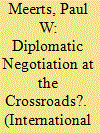

|
|
|
|
|
| Summary/Abstract |
While interstate negotiation is becoming more important than ever in guiding the course of world affairs, it is in danger of being weakened as a consequence of the erosion of multilateral diplomacy. Multilateral organizations and cooperation between states has opened new pathways for negotiation, stabilized the world, and served to equalize power distribution. Growing multilateralism has protected negotiation processes and offered smaller powers more of a say in world affairs. However, with the current trend for powerful countries to undermine multilateral negotiation processes in favor of bilateral and minilateral power-based negotiations, global political gaps are widening. This will undermine small countries and middle powers that want to use diplomatic negotiation as their main tool to influence others. The consequence could be a process of diplomatic negotiation used by hegemonic powers to further their interests to the detriment of the less powerful.
|
|
|
|
|
|
|
|
|
|
|
|
|
|
|
|
| 9 |
ID:
124806
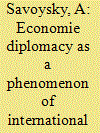

|
|
|
|
|
| Publication |
2013.
|
| Summary/Abstract |
BY THE SECOND DECADE of the 21st century, the academic community in Russia and abroad has not yet reached a consensus on economic diplomacy. There is no more or less concerted approach to the terms and ideas used by economic diplomacy; there is no agreement on the time when economic diplomacy first appeared and on its evolution; there is no agreement on its types and mechanisms. Those who write on diplomatic diplomacy are few and far between: I. Ornatsky and L. Gradobitova, also N. Shchetinin who founded the post-Soviet theory of economic diplomacy, Academician I. Ivanov, T. Zonova, A. Likhachev, M. Konarovsky, D. Degtyarev, and some others. Guy Carron de la Carrière, A. Plashchinsky, N. Bayne, S. Woolcock, A. Kasymov, and B. Giyasov are working on the theory of economic diplomacy abroad. This article is my own attempt at developing the theory still further.
|
|
|
|
|
|
|
|
|
|
|
|
|
|
|
|
| 10 |
ID:
146022
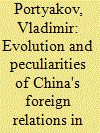

|
|
|
|
|
| Summary/Abstract |
On the basis of methods proposed by scholars of the Institute of Modern International Relations at Tsinghua University (PRC), the author examines the evolution of China's relations with leading countries of East Asia. A forecast is given concerning possible changes in the nature of the PRC's interaction with Vietnam, the U.S.A., Japan, Russia, and the Republic of Korea under the fifth-generation leaders headed by Xi Jinping.
|
|
|
|
|
|
|
|
|
|
|
|
|
|
|
|
| 11 |
ID:
143126
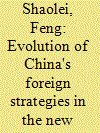

|
|
|
|
|
| Summary/Abstract |
Several significant changes have taken place in Chinas foreign strategies in the last 50-odd years. From the beginning of the 1960s till the end of the Proletarian Cultural Revolution, Chinas foreign strategies were aimed at fighting revisionism and hegemonism, spreading "left-wing extremism," and achieving the world revolution.
|
|
|
|
|
|
|
|
|
|
|
|
|
|
|
|
| 12 |
ID:
111522
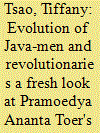

|
|
|
|
|
| Publication |
2012.
|
| Summary/Abstract |
This article undertakes an in-depth exploration of the trope of human evolutionary development undergirding Pramoedya Ananta Toer's Buru Quartet - a trope that has hitherto received no detailed critical attention in Pramoedya scholarship. Drawing on the traditional Javanese values of Pramoedya's childhood and the Marxist ideological values of his early adulthood, the Quartet casts the individual's moral development from selfish individualism to selfless community-mindedness as the development from animalism to 'modern humanity'. In the context of traditional Javanese and Marxist cosmologies, such self-denial ends in victory: respectively, the accumulation of personal power and the successful revolutionary replacement of capitalism with socialism. However, during his brutal imprisonment in the Darwinian wilderness of Buru, Pramoedya experienced an environment that rewarded animalism and made it difficult for those ascribing to 'human' values to survive. Originally composed in Buru, the Quartet bears the mark of its origins and its author's disillusionment, portraying the attainment of Javanese and Marxist standards of humanity as a decision to defy the laws of natural selection and overcome one's instinct for self-preservation. By dissociating the acquisition of humanity from the acquisition of power, the Quartet produces modified versions of the Javanese and Marxist moral human development based not on the expectation of success and the will to live, but on the expectation of failure and the determination to die.
|
|
|
|
|
|
|
|
|
|
|
|
|
|
|
|
| 13 |
ID:
148718
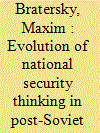

|
|
|
|
|
| Summary/Abstract |
This article contributes to the rich body of literature on Russian security perceptions and analyses how Russian security thinking evolved over the last 20 years. The focus of the article is on how Russian security perspective shifted from the goal of assuring Russian security by integration and cooperation with the West to the idea of Russia’s own separate geo-economic project and the goal of reducing the country’s dependencies on the West. Security in this article is understood both as a military-political and as an economic phenomenon.
|
|
|
|
|
|
|
|
|
|
|
|
|
|
|
|
| 14 |
ID:
112519
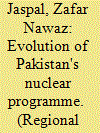

|
|
|
| 15 |
ID:
114083
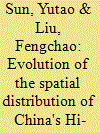

|
|
|
|
|
| Publication |
2012.
|
| Summary/Abstract |
Spatial distribution is an important dimension of research into the development of high technology (hi-tech) industries due to the knowledgeintensive features of these industries. This paper separates the agglomeration effects and the spillover effects, and analyzes the evolution of the spatial distribution of China's hi-tech sub-industries from themid-1990s by combining the geographic concentration index (locational Gini coefficient, concentration ratio) and spatial econometrics (Moran's I). The results reveal that, firstly, most hi-tech subindustries tend to be concentrated in the eastern coastal regions of China, while there are significant spillover effects from the eastern coastal regions to the central regions. The development model based on national hi-tech industrial zones is the primary reason for industrial agglomeration, and it is the result of both government direction andmarket rules. Secondly, on the macro-level, there has been a certain amount of geographical concentration and interregional division of labor among China's hi-tech industries, but there is low intraregional specialization. Furthermore, in contrast to the findings of most of previous studies, the distribution ofChina's hi-tech industries and that of its innovation capacity share similar evolutionary trends, although they do not completely overlap.
|
|
|
|
|
|
|
|
|
|
|
|
|
|
|
|
| 16 |
ID:
151305
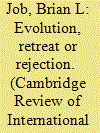

|
|
|
|
|
| Summary/Abstract |
This paper outlines the development and evolution of the normative positions of China, Brazil and India on issues surrounding the responsibility to protect (R2P) by charting their engagement in the ‘institutionalized conversation’ within the United Nations. In doing so, it seeks to dispel characterizations of these states as having adopted individual or common positions that either wholly reject or accept R2P. The nuances of the adaption and adoption of their postures need to be appreciated. Indeed, of the three component ‘pillars’ of R2P, they find themselves in general accord regarding Pillar One (state responsibility) and Pillar Two (prevention and assistance). It is on Pillar Three (reaction and response) that they diverge from each other and find themselves most at variance with ‘Western’ agendas of intervention and regime change. This divergence is most sharply drawn at present, in light of the Libyan and ongoing Syrian experiences.
|
|
|
|
|
|
|
|
|
|
|
|
|
|
|
|
| 17 |
ID:
164978
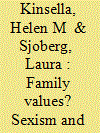

|
|
|
|
|
| Summary/Abstract |
In this article, we focus on the subset of evolutionary theorising self-identified as Feminist Evolutionary Analytic (FEA) within security studies and International Relations. We offer this accounting in four sections. First, we provide a brief overview of the argument that reproductive interests are the ‘origins’ of international violence. Second, we break down the definitions of gender, sex, and sexuality used in evolutionary work in security studies generally and in FEA specifically, demonstrating a lack of complexity in FEA’s accounts of the potential relations among the three and critiquing their essentialist heteronormative assumptions. Third, we argue that FEA’s failure to reflect on the history and context of evolutionary theorising, much less contemporary feminist critiques, facilitates its forwarding of the state and institutions as primarily neutral and corrective bulwarks against male violence. Fourth, we conclude by outlining what is at stake if we fail to correct for this direction in feminist, IR, and security research. We argue that FEA work misrepresents and narrows the potential for understanding and responding to violence, facilitating the continued instrumentalisation of women’s rights, increased government regulation of sexuality, and a more expansive form of militarism.
|
|
|
|
|
|
|
|
|
|
|
|
|
|
|
|
| 18 |
ID:
137557
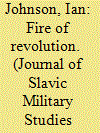

|
|
|
|
|
| Summary/Abstract |
In August, 1920, the fate of Europe hung in the balance. Bolshevik forces stood poised to take Warsaw, while Lenin contemplated the possibility of invading Germany. General von Seeckt in Germany considered renouncing the Treaty of Versailles, thus threatening a new world war. In France and Great Britain, senior leaders reluctantly and with great hesitation discussed military intervention in Eastern Europe. Using primary source material from American, British, German, and Polish archives, this study offers new conclusions about the landscape of post-war Europe through a counterfactual analysis of the Battle of Warsaw.
|
|
|
|
|
|
|
|
|
|
|
|
|
|
|
|
| 19 |
ID:
131061
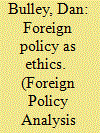

|
|
|
|
|
| Publication |
2014.
|
| Summary/Abstract |
This article notes that while ethics is increasingly talked of in foreign policy, it remains a blindspot for foreign policy analysis (FPA). It argues that this must be rectified through a critical approach which conceptualizes foreign policy as ethics. The first section examines how even constructivist approaches, which are highly attuned to the intersubjective sphere, still generally avoid dealing with morality. The second section looks at the possibilities and limits of one piece of constructivist theorizing that explores the translation of morality into foreign policy via "norms." This demonstrates the problems that a constructivist account, with its tendency toward explanatory description without evaluation, will always face. The final section argues, through an examination of EU foreign policy (from 1999 to 2004) and its innovative use of "hospitality," that FPA must critically reassess the value of the norms and principles by which foreign policy operates in order to suggest potentially more ethical modes of encounter.
|
|
|
|
|
|
|
|
|
|
|
|
|
|
|
|
| 20 |
ID:
092688
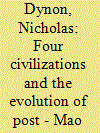

|
|
|
|
|
|
|
|